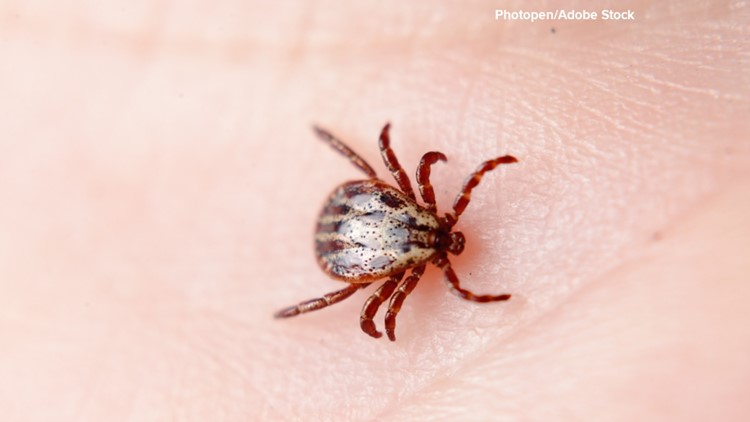INDIANAPOLIS — With warmer weather increasing in Indiana, ticks are becoming more active. That's why Indiana health officials urged Hoosiers on Friday to protect themselves from tick bites before heading outdoors this weekend.
“We are all ready to enjoy the outdoors again after being inside over much of the winter,” said State Public Health Veterinarian Jennifer Brown, who said tick-borne illnesses are preventable.
Lyme disease is the most common tick-borne disease in Indiana, but Hoosiers are also at risk for other tick-borne diseases, including ehrlichiosis and a group of diseases that includes Rocky Mountain Spotted Fever. While the risk for ehrlichiosis is highest in southern Indiana, tick-borne diseases are present all over the state from early spring through late fall.
Precautions
- Treat boots, clothing and outdoor gear (not skin) with 0.5% permethrin
- Use EPA-registered insect repellents with active ingredients such as DEET, picaridin, IR3535, oil of lemon eucalyptus (OLE), para-menthane-diol (PMD) or 2-undecanone.
- Treat pets for ticks in consultation with a veterinarian.
Ticks are generally found near the ground, in brushy or wooded areas. They can’t jump or fly. Instead, they climb tall grasses or shrubs and wait for a potential host to brush against them. When this happens, they climb onto the host and seek a site for attachment.
Thoroughly check for ticks on clothing, gear, pets and skin after outdoor exposure. Tumbling clothes in the dryer on high heat for 30 minutes will kill ticks, and showering can help rinse off any unattached ticks.
"Quickly finding and removing a tick can help prevent you from becoming sick,” Brown said.
Ticks can be safely removed by using tweezers to grasp the tick close to the skin and then pulling outward with steady and even pressure. After the tick is removed, the area should be washed thoroughly. Ticks should never be crushed with the fingernails. Ticks can be flushed down the toilet or wrapped tightly in tape and thrown in the trash.
After an attached tick has been removed, it can be saved in a sealed bag or container of alcohol for later inspection in case the host person or pet becomes ill. Testing ticks to see if they are carrying diseases is not generally recommended because a test will not predict whether a disease was actually transmitted to a host.
Anyone who becomes ill after finding an attached tick should see a medical provider immediately and alert the provider to the exposure. Most tick-borne diseases can be treated with antibiotics, and prompt diagnosis can help prevent complications.
What other people are reading:
- Indianapolis teens open up about city's record violence
- Boone County man charged with wife's murder wins Republican primary for town board
- OneAmerica 500 Festival Mini-Marathon running ambassador helping fellow Special Olympics athletes cross the finish line
- Hoosiers start receiving $125 automatic tax refund
- IMS reverses cooler policy, will allow coolers in the Snake Pit



